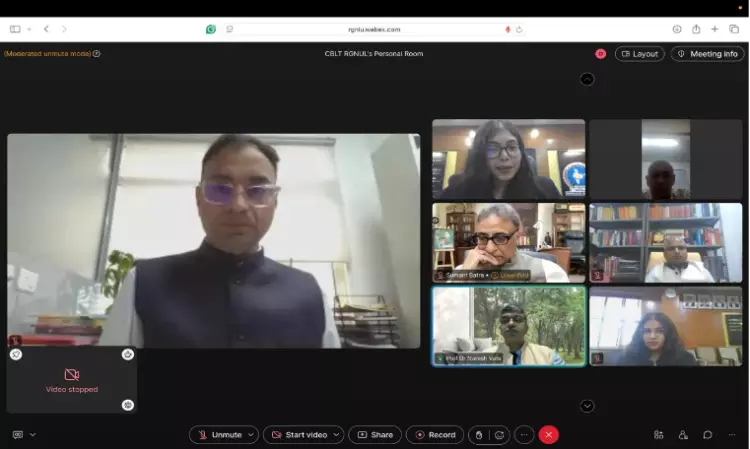RGNUL Hosted International Conference On Insolvency & Bankruptcy Law
LIVELAW NEWS NETWORK
9 Sept 2025 12:03 PM IST

The Centre for Business Laws and Taxation (CBLT), Rajiv Gandhi National University of Law, Punjab, hosted a two-day International Conference on Insolvency and Bankruptcy Law: Challenges and Opportunities on September 6-7. 2025 in the online mode.
Prof. (Dr.) Jai Shankar Singh, Vice-Chancellor of the University inaugurated the conference. He talked about the transformative role of insolvency reforms in India's financial and corporate ecosystem. Prof. Shankar discussed the impact of geopolitical shocks on Micro Small and Medium Enterprises exposing them to vulnerabilities in current frameworks. He emphasized that there is a need to examine the personal guarantor jurisprudence. He stressed that there is a need to explore the evolving framework of insolvency in India, the challenges faced in its implementation, and the opportunities it presents for strengthening the financial and legal system.
Mr. Sumant Batra, the first Asian President of INSOL International and Founder of the Insolvency Law Academy, offered insights on challenges to insolvency reforms. He highlighted the judiciary's role in shaping Insolvency and Bankruptcy Code (IBC) jurisprudence, the global relevance of Insolvency and Bankruptcy Board of India. He stressed that need to learn lessons from Singapore's reforms.
Prof. (Dr.) Naresh Vats, Dean Academic Affairs of the University underlined the value of such academic platforms in equipping students with exposure beyond classrooms and preparing them for professional engagements. Prof. Vats remarked that Insolvency law has emerged as one of the dynamic areas of legal reform in recent years, shaping not only the corporate sector but also the larger economic framework of our country.
Dr. Manoj Kumar, Faculty Coordinator of CBLT–IBLD, reflected on the development of the Insolvency and Bankruptcy Code (IBC) and emphasized the importance of time-bound resolution as the Code's cornerstone. The inaugural concluded with a vote of thanks by Dr. Manoj Sharma, appreciating the efforts of speakers, faculty, and the student team.
The panel discussion on Group Insolvency, generated an exchange of ideas among speakers and participants. The discussion brought together a mix of Indian and international perspectives, emphasizing the urgency of addressing group and cross-border insolvency within India's still maturing insolvency ecosystem.
Speakers and panellists who participated in the conference were Professor Jason Harris, Professor of Corporate Law, Director, Ross Parsons Centre for Commercial, Corporate and Taxation Law, The University of Sydney Law School, Australia; Mr. Sidhant Kant: Equity Partner, Shardul Amarchand Mangaldas; Mr. Akash Chandra Jauhari, Co-Lead, Corporate Law and Financial Regulation Team, Vidhi Centre for Legal Policy; Mr. Ankit Goel, Chartered Accountant; Insolvency Professional, Founder & Partner, AAA Insolvency Professionals LLP; and, Ms. Pooja Bahry, Insolvency Professional.Prof. Jason Harris of the University of Sydney provided a comparative overview of Australia's insolvency regime. He traced the development of group insolvency in Australia, outlining both its achievements and shortcomings. Notably, he explained how Australia's broad definition of a “group” offers flexibility but also risks ambiguity, which complicates resolution when different companies in the same group undergo different types of insolvency. Drawing parallels, he observed that India's draft framework shares some features with the Australian approach, offering lessons but also cautionary tales.
The session also featured a lively Q&A segment where students and delegates engaged the panelists with questions on real-world challenges such as jurisdictional conflicts, creditor coordination in multinational groups, and the enforceability of foreign judgments. Panelists responded with practical insights, explaining the interplay between domestic priorities and global obligations. The discussion combined theoretical reflection with grounded policy insights, offering participants a comprehensive understanding of the road ahead for India's group insolvency framework.
The Two-Day International Conference provided an overview of the IBC's strengths, challenges, and future pathways. The Conference underscored the Code's economic significance, global relevance, and the need to address group and cross-border insolvency. The seven technical sessions showcased research, proposing reforms ranging from AI-driven early warning systems and blockchain integration to Environment Social and Governance prioritization, mediation frameworks, and substantive consolidation. Across sessions, the consensus was clear: while the IBC has transformed India's insolvency landscape by enhancing recovery and credit discipline, pressing gaps such as judicial delays, weak cross-border mechanisms, group insolvency challenges, and inadequate individual insolvency provisions—must be addressed through strategic legislative and institutional reforms.


